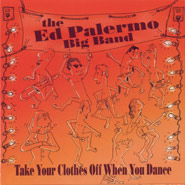
The Ed Palermo Big Band
Take Your Clothes Off When You Dance
(Cuneiform)
It
was about eight years ago that I happened to read for the first time
about The Ed Palermo Big Band, a large, quasi-jazz line-up that was
said to be quite well-rehearsed and capable of producing results of
a very high quality under the guidance of its leader, an alto saxophone
player and an arranger whose CV was already of respectable length. I
have to confess that my first reaction upon learning that the band had
released Big Band Zappa, a CD featuring "jazzy" arrangements
of famous Zappa compositions, had not been one of enthusiasm: the Mustachioed
Maestro having died not too long before, I thought that what his work
really needed was the appreciation by a new, and different, slice of
the audience, not some more "new and decidedly personal rearrangements"
(I’d say things have not changed a whole lot since then). Looking at
the names of those who guested on the album only made my suspiciousness
grow: David Samuels and Mike Keneally were both names I considered as
being good (later the latter talked about some difficult recording conditions
that had caused his contribution to be "far from ideal"),
while Mike Stern and Bob Mintzer made me think about some "fusionoid
extravaganza" that it was really better for me to avoid. And this
is exactly what happened.
Here
I have to admit that I was wrong (well, not completely wrong…): it’s
true that Bob Mintzer’s tenor sax was not too bad (especially on King
Kong), and that Mike Stern’s intelligent modesty was a nice counterbalance
to a somewhat "generic" approach to the material on his part;
but the rest was much better than what I expected. Some good repertory
choices by Palermo, who had decided to mostly dedicate his attention
to "first period" (let’s define it as roughly 1966-1970) compositions,
which he obviously felt as nearer to his heart. Presenting a vocal piece
as an instrumental wasn’t a bad choice, either. Quite a few nice orchestral
colours, with muted trumpets, flutes and clarinets. A nice wind section,
backed by a good and agile rhythm section: Ray Marchica on drums, Paul
Adamy on electric bass, Bob Quaranta on piano and Ted Kooshian on a
Kurzweil sampler, which is often used for a classic timbre so reminiscent
of the Hammond B-3 organ. Placed as the first track, the famous Peaches
En Regalia is not at its best; better tracks being Toads Of The Short
Forest, with a nice solo by Kooshian; Who Are The Brain Police; Twenty
Small Cigars, featuring Samuels on vibes (even if the choice of tempo
is maybe not the best); the already mentioned King Kong; Waka/Jawaka;
Sofa #1, with solos by Palermo and Samuels; The Little House I Used
To Live In. The ending of We Are Not Alone is quite bizarre, with those
solo guitars backed by a wind ostinato which reminded me of the intricate
solo by Randy California – backed by winds arranged by Marty Paich –
which is the climax of Aren’t You Glad by Spirit (!), off The Family
That Plays Together.
Totally
unexpected on my part, here it comes the new chapter by Ed Palermo and
his Big Band. I’ll immediately say that Take Your Clothes Off When You
Dance has a very nice feature: the music is always happy and joyous,
never rhetorical or lugubrious. With the partial exception of just one
track, all solos (and there are a lot of them) always show a link –
via logic or feeling – to their themes, in so avoiding one of the "jazzy"
most common failures. Compared to its predecessor, the present album
sounds a lot better, with an important consequence: while listening
to Big Band Zappa made one see a (physical) orchestra where the rhythm
section sustained everybody and musicians stood for their solos (which
is something that after repeated listening can became somewhat tedious),
here the recording concept is a lot more "modern and artificial",
in my opinion this makes for a better work. Take Your Clothes Off When
You Dance shows its love right from the graphics, with the funny cover
design, those liner notes à la Uncle Meat and those little things
(like "tasty little sucker") that Fans of Zappa will be quite
happy to spot.
The
chosen repertory follows the same criteria used on Big Band Zappa. We
have a classic opener in RDNZL, with nice solos by Palermo, Charles
Gordon (trombone), Quaranta and Kooshian. There’s a nice version of
Take Your Clothes Off When You Dance, all contagious Latin rhythms,
with solos by Joe Fiedler (trombone) and Ben Kono (tenor sax). Dwarf
Nebula Processional March & Dwarf Nebula sees its theme nicely performed
and a nice solo by Cliff Lyons (alto sax). Very good arrangement for
Pound For A Brown On The Bus, with solos by Palermo, Kooshian and Bill
Straub (tenor sax). In my opinion Sleep Dirt is maybe the high point
of the whole album: delicate and more than a bit sad, with a very good
and quite appropriate solo by Phil Chester on soprano sax. Appropriately
aggressive, Gumbo Variations has a "greasy" tenor sax solo
by Dave Riekenberg and a nice guitar solo by Carl Restivo, whose performance
definitely convinces. Restivo is back – this time, as a singer – in
the Mom And Dad/Oh No medley, with a good alto sax solo by Palermo.
Nice CD closing with Moggio, which sports keyboard solos by both Quaranta
and Kooshian.
In
an unspecified place among Uncle Meat, Roxy & Elsewhere, Zappa In
New York and The Best Band You Never Heard In Your Life Ed Palermo appears
to have found himself. See you on tour?
Beppe Colli
© Beppe Colli 2006
CloudsandClocks.net | June 23, 2006


